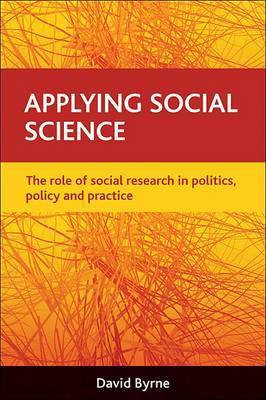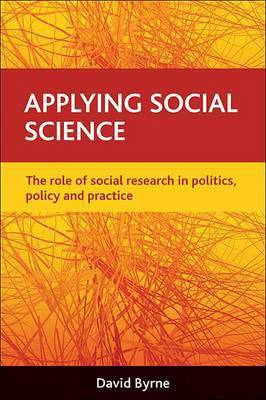
- Afhalen na 1 uur in een winkel met voorraad
- Gratis thuislevering in België vanaf € 30
- Ruim aanbod met 7 miljoen producten
- Afhalen na 1 uur in een winkel met voorraad
- Gratis thuislevering in België vanaf € 30
- Ruim aanbod met 7 miljoen producten
Zoeken
Applying Social Science
The Role of Social Research in Politics, Policy and Practice
David Byrne
Paperback | Engels
€ 77,95
+ 155 punten
Uitvoering
Omschrijving
In complex contemporary societies social science has become increasingly interwoven into the whole fabric of governance. At the same time there is an increasing recognition that attempts to understand the social world which seek to mimic the linear approaches of the conventional 'hard sciences' are mostly useless given the complex systems character of society in all its aspects. This book draws on a synthesis of critical realism and complexity theory to examine how social science is applied now and how it might be applied in the future in relation to social transformation in a time of crisis. A central argument is that there is no such thing as a 'pure' science of the social and that a recognition of the inevitability of application imposes obligations on social scientists wherever they work which challenge the passivity of most in the face of inequality and injustice.
Specificaties
Betrokkenen
- Auteur(s):
- Uitgeverij:
Inhoud
- Aantal bladzijden:
- 240
- Taal:
- Engels
Eigenschappen
- Productcode (EAN):
- 9781847424501
- Verschijningsdatum:
- 16/02/2011
- Uitvoering:
- Paperback
- Formaat:
- Trade paperback (VS)
- Afmetingen:
- 155 mm x 231 mm
- Gewicht:
- 362 g

Alleen bij Standaard Boekhandel
+ 155 punten op je klantenkaart van Standaard Boekhandel
Beoordelingen
We publiceren alleen reviews die voldoen aan de voorwaarden voor reviews. Bekijk onze voorwaarden voor reviews.











